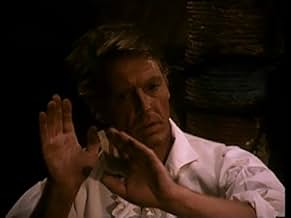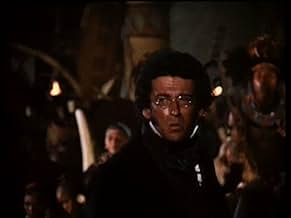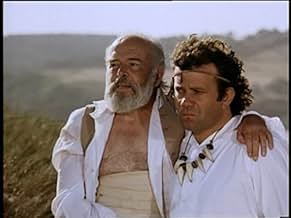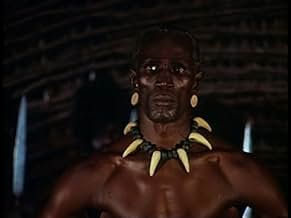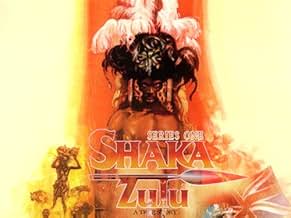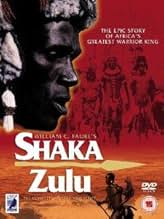IMDb RATING
7.7/10
3.5K
YOUR RATING
A historical account on the life of the Zulu King Shaka.A historical account on the life of the Zulu King Shaka.A historical account on the life of the Zulu King Shaka.
Browse episodes
Featured reviews
You can never read enough history on the Imperial road to ash & the genocidal/ educational civilization offered to the native folks who outnumbered the greatest bluffers who served that Empire. I never expect to learn true history from film or tv even if the source material is excellent. After all the losers have the best stories sometimes. But good works like this with great acting dialogue, locations and a cast of many extras in sumptuous costume, can inspire many to read books written 100 years ago ( before the Orwellian revisions removed the overt racism & collusion in slavery etc in school history class) that authors expressed without guilt. Those tend to be more believable to me! Fresh memories and all.
Of course I know they like to have the great decent white guy protagonist in Hollywood movies about Empire etc. but THIS is an balanced work that tells of the time where even the important figure in charge of the expedition( to avoid a war England could not win nor afford) is still motivated by simple greed. The episodes so far show how often the white guys tried the bluff method so often they were already a few decades away from losing India. I LOVE the details & a story which I hope will be retold again. This history isnt just for the British or Africa but the whole world. The dry wit & cynical Captian Farewell doesnt mind that a man without scruples could just about become a God in this country....LOL also shows how underestimated their African hosts/servants were all along. Indeed the corruption in the third remains the lasting legacy of Spain, France, Portugal & Great little Britian's legacy. The Zulu spirituality depicted isnt any less potent or scary than the one the Missionaries brought over. Worshiping suffering seems to be an odd human mental condition. Still any movie about 1700-1800s Africa or the Arctic or Peru or Mississippi SHOULD be a terrifying/exhilarating tale. I liked the fearless legend & reality of Shaka & the actor is so intense & just looks amazing. The scenery is huge and filled with so much great set design natural beauty horses, costumes...Its just got alot to see. I will be watching it again with my daughter. It tells a true story that provokes more curiosity of the era & the real people. Many episodes focus on the other side of the story, the Africans & their struggle to deal with alliances as well as the snakes that came ashore. I've never seen so many gorgeous women proudly wearing the clothing of their ancestors with pride & confidence. Real African actors made this an amazing film. Long before a comic book film.
Of course at the start they always have the scenes with the exchanging of gifts and boy its withering even to watch the Englishmen melting in their uniforms! The old mirror trick.... (They always have to lie about the king they represent right? And what a gross king IV yuck. )They did this one well. Thats just in 2nd episode. I almost never seen this much time given to any famous historical African beyond Mandela. Or Amin. (Perhaps Netflix will change that. Lots of foreign films to see!)
This guy was the Napoleonic Desert King in his time. I hope they make more series set in this era. NETFLIX had this on to watch & now the $ to make something as great as this now & Game of Thrones sized series. I hope they do it before it all goes boom.LOL
Ok so I totally recommend this. Its got EVERYTHING. Only a terrible storyteller can make history boring. I hope Neflix puts some money into this movie's period --regardless of the location on the globe. It was a time where we still had to discover each other. I love them anyway & a series can really get alot of layers. It aged well.
I think this is, unfortunately, a unique series, showing history at least partially from a Zulu perspective, unlike similar movies like Zulu and Zulu Dawn. These movies show history from the colonialists' side and therefore leave a lot of questions unanswered. What were the political and social dynamics of the creation and rise of the Zulu kingdom? What were social relations and even every day like? This series goes a little way in addressing these topics, only a little, but a lot more than any Western television series or movie before it, which is what makes it unique. It wouldn't be misplaced in any modern (high school) class room. Henry Cele is great as the Zulu king to be, the music is great although basically Western, and the story would put any soap opera to shame. Realism is tops, with all the major African players being South African and it being filmed in South Africa. Where it falls down or slows, is when it goes to the more familiar narrative of the colonials, although Edward Fox is good, as always, as is Robert Powell. The series was of course also very topical, because even though it dealt with a war and struggle 108 years earlier, it was also about a fight for freedom and independence that wasn't won until 13 years ago and that is still in the process of being fulfilled.
Recommended.
Recommended.
I must say I was sorry when I got to the 10th and last episode of "Shaka Zulu". I totally agree with the review by njmollo, very good. The acting of Shaka by Henry Cele is really what made the movie as good as it was and I could not think of anyone else acting as Shaka after having seen Henry Cele as Shaka, it has to be the top casting and acting ever. I find it incredible disappointing that when I look up Shaka Zulu the first actors mentioned are the white English actors, not Henry Cele??? Not saying that the acting by the English was not good but certainly not superior to all the black actors who were very good, such a pleasure to watch as was the portrayal of the Zulu culture and lifestyle. Loved it.
i must say i have been having quite a laugh at the ridiculous statements made about this. 1: it was not a propaganda film made by the white government to woo the Zulus, utter trash! the white government wanted nothing to do with it, especially as it was being made by a white south African, it was only made because harmony gold the American TV company got involved. 2: it was not taken from the writings of Francis farewell it was based on henry Finns diary (played by Robert Powell). 3: the savagery certainly was not exaggerated thats me off my soap box. the film is quite brilliant, although not historically correct in many places as Joshua Sinclare has used a lot of poetic licence to make a more interesting story, not that the real story is uninteresting, for television. highly entertaining with very real portrayals of traditional Zulu life, i know i lived with them i am south African. but my saying has always been don't listen to others watch it and make up your own mind, i just don't like people who are ignorant and make comments with out knowing what they are talking about.
Thinking of South-Africa and the 1980s in one context, three things come to mind: apartheid, boycott and the mini-series "Shaka Zulu". I'd place this among the best mini-series of the 80's and 90's, among shows like "Shogun", "Tai-Pan", "Roots" and "North and South". "Shaka Zulu" has bit from all of them. It's got history; it's got adventure and action, it has compelling characters and story lines that keep you glued to the screen.
Shaka has most often been described as the Napoleon of Africa", which isn't incorrect, yet, I myself do like to see him as the King Arthur of South Africa. This is mainly due to having read Thomas Mofolos "Chaka Zulu" prior to having seen the TV-series. If you're the reading type, I recommend you to pick it up; it's not only a masterpiece of storytelling, but combines history and mysticism perfectly. Some of the mystic elements have made it into the series (the prophecy of Shaka's rise to power; the forging of Shaka's spear), but generally the story of the TV-show is rooted in reality.
What's to be said about the actors? Well, people like Edward Fox, Robert Powell or Fiona Fullerton are beyond dispute, doing a fine job as would be expected. Same goes by short but poignant guest-appearances by the likes of Sir Christopher Lee, Trevor Howard and Roy Dotrice (superb as a decadent King George IV) but the real kudos must go to the South African cast which, despite being mainly laymen actors, come across as convincingly and authentic as they come.
Former South-African football hero Henry Cele embodies Shaka Zulu like Helmut Berger embodied King Ludwig II of Bavaria, imposing and final. Dudu Mkize virtually steals the scenes she's in, with a mix of grace and dignity that is rare to see on modern TV or Conrad Magwaza as Shakas father Senzagakona and Gugu Nxumalo as Shakas feline-like aunt Mkabayi. Sadly, most of those actors were never seen on screen again; Cele starring in a couple of low-budget action / horror flicks (among them "The Ghost and the Darkness), same goes for Mkizi and for Magwaza (apart in a guest-appearance in a film about Albert Schweizer) and Nxumala, "Shaka Zulu" that remained their only appearance on the silver screen.
In essence, this is a (mini)-series that makes you feel sad once you've reached the final episode: sad that it's over and that there is no more. One wishes it would have gone on, that one could have seen more of the characters, their stories, and more of the rich Zulu culture and its history.
I'd give it 10/10 points if it wasn't for the abrupt, sudden ending, which comes as a bit of a let-down, so 9 from 10 will have to do.
Shaka has most often been described as the Napoleon of Africa", which isn't incorrect, yet, I myself do like to see him as the King Arthur of South Africa. This is mainly due to having read Thomas Mofolos "Chaka Zulu" prior to having seen the TV-series. If you're the reading type, I recommend you to pick it up; it's not only a masterpiece of storytelling, but combines history and mysticism perfectly. Some of the mystic elements have made it into the series (the prophecy of Shaka's rise to power; the forging of Shaka's spear), but generally the story of the TV-show is rooted in reality.
What's to be said about the actors? Well, people like Edward Fox, Robert Powell or Fiona Fullerton are beyond dispute, doing a fine job as would be expected. Same goes by short but poignant guest-appearances by the likes of Sir Christopher Lee, Trevor Howard and Roy Dotrice (superb as a decadent King George IV) but the real kudos must go to the South African cast which, despite being mainly laymen actors, come across as convincingly and authentic as they come.
Former South-African football hero Henry Cele embodies Shaka Zulu like Helmut Berger embodied King Ludwig II of Bavaria, imposing and final. Dudu Mkize virtually steals the scenes she's in, with a mix of grace and dignity that is rare to see on modern TV or Conrad Magwaza as Shakas father Senzagakona and Gugu Nxumalo as Shakas feline-like aunt Mkabayi. Sadly, most of those actors were never seen on screen again; Cele starring in a couple of low-budget action / horror flicks (among them "The Ghost and the Darkness), same goes for Mkizi and for Magwaza (apart in a guest-appearance in a film about Albert Schweizer) and Nxumala, "Shaka Zulu" that remained their only appearance on the silver screen.
In essence, this is a (mini)-series that makes you feel sad once you've reached the final episode: sad that it's over and that there is no more. One wishes it would have gone on, that one could have seen more of the characters, their stories, and more of the rich Zulu culture and its history.
I'd give it 10/10 points if it wasn't for the abrupt, sudden ending, which comes as a bit of a let-down, so 9 from 10 will have to do.
Did you know
- TriviaThis has been the most frequently broadcast TV mini-series in the U.S. By 1992, over 350 million viewers had seen it. This mini-series dislodged The Hunters (1957) and Les dieux sont tombés sur la tête (1980) and its sequels as the prime shaper of American perceptions of "tribal" history in southern Africa. The series even achieved cult status. The U.K. actors and actresses who worked on the project were nearly blacklisted by the U.N.
- Alternate versionsAlso released on video in an edited, 'feature length' version.
- ConnectionsFollowed by Shaka Zulu: The Citadel (2001)
- SoundtracksWe Are Growing
By Patric van Blerk, Julian Laxton, Margaret Singana and David Pollecutt (as Dave Pollecutt)
Sung by Margaret Singana and the Baragwanath Choir
- How many seasons does Shaka Zulu have?Powered by Alexa
Details
Contribute to this page
Suggest an edit or add missing content







